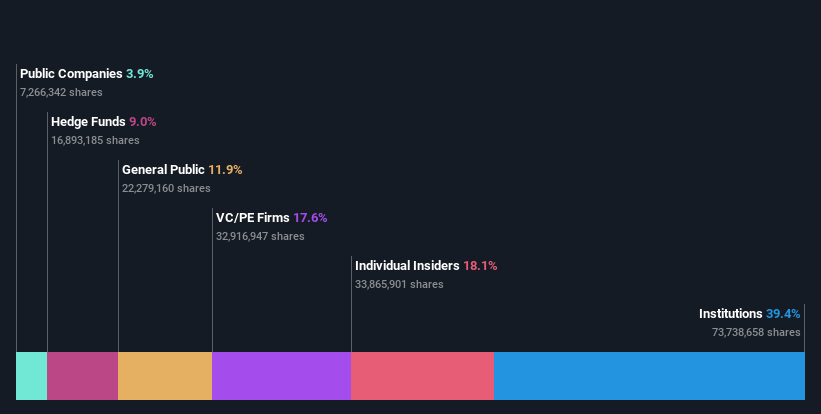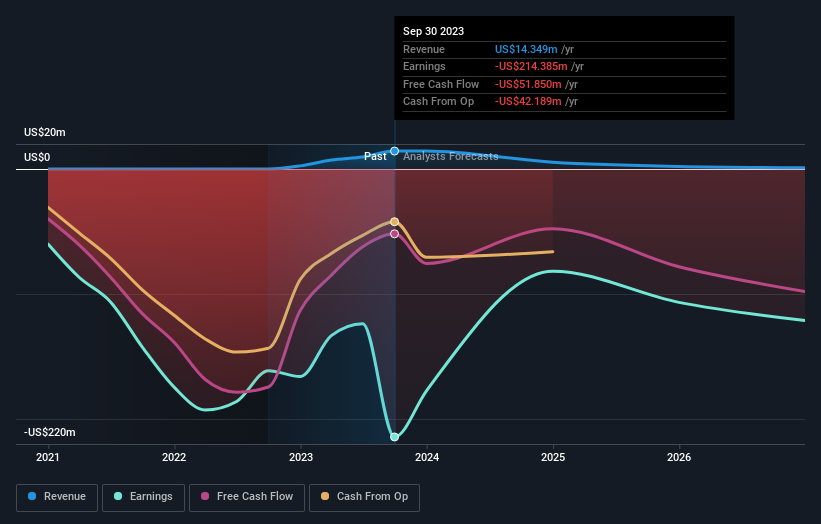Owning 39% shares,institutional owners seem interested in Taysha Gene Therapies, Inc. (NASDAQ:TSHA),
Key Insights
Significantly high institutional ownership implies Taysha Gene Therapies' stock price is sensitive to their trading actions
A total of 5 investors have a majority stake in the company with 52% ownership
To get a sense of who is truly in control of Taysha Gene Therapies, Inc. (NASDAQ:TSHA), it is important to understand the ownership structure of the business. The group holding the most number of shares in the company, around 39% to be precise, is institutions. In other words, the group stands to gain the most (or lose the most) from their investment into the company.
Given the vast amount of money and research capacities at their disposal, institutional ownership tends to carry a lot of weight, especially with individual investors. As a result, a sizeable amount of institutional money invested in a firm is generally viewed as a positive attribute.
Let's delve deeper into each type of owner of Taysha Gene Therapies, beginning with the chart below.
See our latest analysis for Taysha Gene Therapies
What Does The Institutional Ownership Tell Us About Taysha Gene Therapies?
Institutional investors commonly compare their own returns to the returns of a commonly followed index. So they generally do consider buying larger companies that are included in the relevant benchmark index.
Taysha Gene Therapies already has institutions on the share registry. Indeed, they own a respectable stake in the company. This can indicate that the company has a certain degree of credibility in the investment community. However, it is best to be wary of relying on the supposed validation that comes with institutional investors. They too, get it wrong sometimes. When multiple institutions own a stock, there's always a risk that they are in a 'crowded trade'. When such a trade goes wrong, multiple parties may compete to sell stock fast. This risk is higher in a company without a history of growth. You can see Taysha Gene Therapies' historic earnings and revenue below, but keep in mind there's always more to the story.
Our data indicates that hedge funds own 9.0% of Taysha Gene Therapies. That catches my attention because hedge funds sometimes try to influence management, or bring about changes that will create near term value for shareholders. FMR LLC is currently the company's largest shareholder with 13% of shares outstanding. For context, the second largest shareholder holds about 13% of the shares outstanding, followed by an ownership of 9.9% by the third-largest shareholder.
On looking further, we found that 52% of the shares are owned by the top 5 shareholders. In other words, these shareholders have a meaningful say in the decisions of the company.
Researching institutional ownership is a good way to gauge and filter a stock's expected performance. The same can be achieved by studying analyst sentiments. There are a reasonable number of analysts covering the stock, so it might be useful to find out their aggregate view on the future.
Insider Ownership Of Taysha Gene Therapies
The definition of company insiders can be subjective and does vary between jurisdictions. Our data reflects individual insiders, capturing board members at the very least. Company management run the business, but the CEO will answer to the board, even if he or she is a member of it.
Most consider insider ownership a positive because it can indicate the board is well aligned with other shareholders. However, on some occasions too much power is concentrated within this group.
It seems insiders own a significant proportion of Taysha Gene Therapies, Inc.. It has a market capitalization of just US$316m, and insiders have US$57m worth of shares in their own names. This may suggest that the founders still own a lot of shares. You can click here to see if they have been buying or selling.
General Public Ownership
The general public, who are usually individual investors, hold a 12% stake in Taysha Gene Therapies. While this group can't necessarily call the shots, it can certainly have a real influence on how the company is run.
Private Equity Ownership
With a stake of 18%, private equity firms could influence the Taysha Gene Therapies board. Sometimes we see private equity stick around for the long term, but generally speaking they have a shorter investment horizon and -- as the name suggests -- don't invest in public companies much. After some time they may look to sell and redeploy capital elsewhere.
Public Company Ownership
We can see that public companies hold 3.9% of the Taysha Gene Therapies shares on issue. It's hard to say for sure but this suggests they have entwined business interests. This might be a strategic stake, so it's worth watching this space for changes in ownership.
Next Steps:
It's always worth thinking about the different groups who own shares in a company. But to understand Taysha Gene Therapies better, we need to consider many other factors. Be aware that Taysha Gene Therapies is showing 4 warning signs in our investment analysis , and 2 of those are significant...
If you would prefer discover what analysts are predicting in terms of future growth, do not miss this free report on analyst forecasts.
NB: Figures in this article are calculated using data from the last twelve months, which refer to the 12-month period ending on the last date of the month the financial statement is dated. This may not be consistent with full year annual report figures.
Have feedback on this article? Concerned about the content? Get in touch with us directly. Alternatively, email editorial-team (at) simplywallst.com.
This article by Simply Wall St is general in nature. We provide commentary based on historical data and analyst forecasts only using an unbiased methodology and our articles are not intended to be financial advice. It does not constitute a recommendation to buy or sell any stock, and does not take account of your objectives, or your financial situation. We aim to bring you long-term focused analysis driven by fundamental data. Note that our analysis may not factor in the latest price-sensitive company announcements or qualitative material. Simply Wall St has no position in any stocks mentioned.


